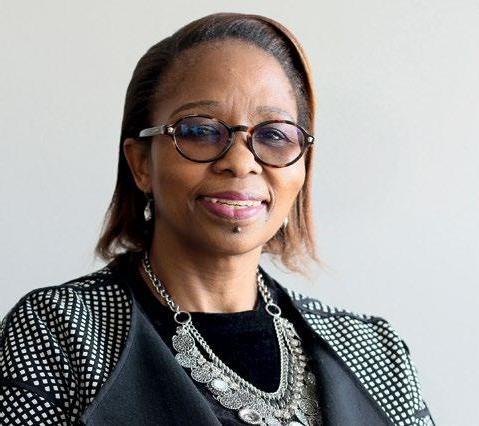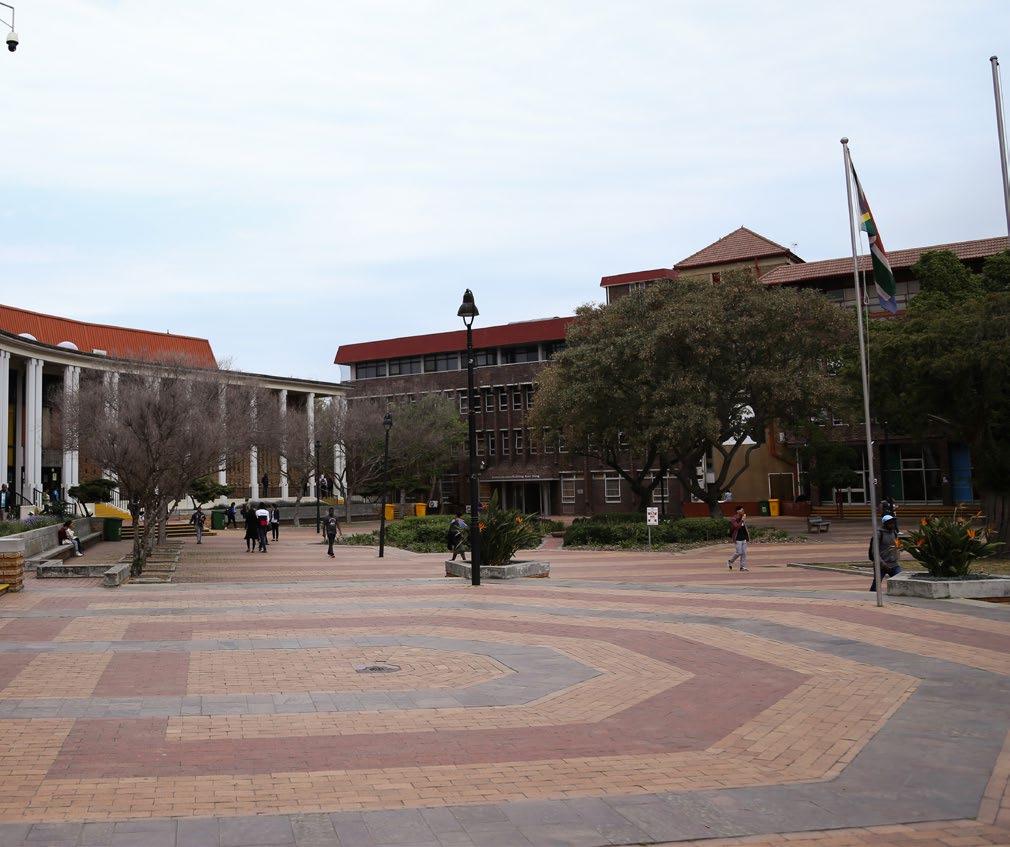
10 minute read
DEAN: FACULTy OF ECONOMIC AND MANAGEMENT SCIENCES
the faculty Of ecOnOmic anD management ScienceS citatiOnS

2015 faculty Of ecOnOmic anD management ScienceS taBle 4
1. Bayat, A., Louw, W., & Rena, R. (2015). Typologies of underperforming schools: evidence from the Western Cape Province of South Africa. International Journal of Education Economics and Development, 6(3), 183–208. https://doi.org/10.1504/IJEED.2015.073156
2.
3.
4. Bayat, A., Naicker, V., & Combrinck, T. (2015). Towards an Understanding of How School Administrative Clerk’s Negotiate Their Work in Public Schools: A Social Worlds Perspective. International Journal of Educational Sciences, 8(2), 293–303. https://doi.org/10.1080/09751122.2015.11890251
Brijlal, P., & yan, B. (2015). Accessing bank finance in relation to human capital, gender and race among SMMEs in a developing economy. 2015 IEEE International Conference on Industrial Engineering and Engineering Management (IEEM), 1133–1137. https://doi.org/10.1109/IEEM.2015.7385825
du Plessis, M., Wakelin, Z., & Nel, P. (2015). The influence of emotional intelligence and trust on servant leadership. SA Journal of Industrial Psychology, 41(1), 9. http://dx.doi.org/10.4102/sajip.v41i1.1133
5.
6.
7.
8. Jacobs, F., Jordhus-Lier, D., & de Wet, P. T. (2015). The Politics of Knowledge: Knowledge Management in Informal Settlement Upgrading in Cape Town. Urban Forum, 26(4), 425–441. https://link.springer.com/article/10.1007/s12132-015-9258-4 https://link.springer.com/article/10.1007/s12132-015-9258-4
Mahembe, B., Engelbrecht, A. S., Chinyamurindi, W., & Kandekande, L. R. (2015). A study to confirm the reliability and construct validity of an organisational citizenship behaviour measure on a South African sample. SA Journal of Industrial Psychology, 41(1), 8. http://dx.doi.org/10.4102/sajip.v41i1.1289
Muchadenyika, D. (2015). Slum upgrading and inclusive municipal governance in Harare, Zimbabwe: New perspectives for the urban poor. Habitat International, 48, 1–10. https://doi.org/10.1016/j.habitatint.2015.03.003
Muchadenyika, D. (2015). Women struggles and large-scale diamond mining in Marange, Zimbabwe. The Extractive Industries and Society, 2(4), 714–721. https://doi.org/10.1016/j.exis.2015.08.003
9.
10.
11.
12.
13.
14.
2016
1.
2.
3.
4.
5.
6. Nel, P., du Plessis, M., & Bosman, L. (2015). Comparing different versions of the Rahim EI questionnaire in a South African context: A confirmatory factor analysis approach. SA Journal of Industrial Psychology, 41(1), 9. http://dx.doi.org/10.4102/sajip.v41i1.1220
Piper, L., & Anciano, F. (2015). Party over outsiders, centre over branch: how ANC dominance works at the community level in South Africa. Transformation: Critical Perspectives on Southern Africa, 87(1), 72–94. https://muse.jhu.edu/article/583313
Piper, L., & von Lieres, B. (2015). Mediating between state and citizens: the significance of the informal politics of third-party representation in the global south. Citizenship Studies, 19(6-7), 696–713. https://doi.org/10.1080/13621025.2015.1053794
Steyn, C., & de Klerk, J. J. (2015). Serving up the self: Role identity and burnout in client service environments. SA Journal of Industrial Psychology, 41(1), 12. http://dx.doi.org/10.4102/sajip.v41i1.1279
Swatuk, L. A. (2015). Water conflict and cooperation in Southern Africa. https://doi.org/10.1002/wat2.1070
Wright, G., Neves, D., Ntshongwana, P., & Noble, M. (2015). Social assistance and dignity: South African women’s experiences of the child support grant. Development Southern Africa, 32(4), 443–457. https://doi.org/10.1080/0376835X.2015.1039711
faculty Of ecOnOmic anD management ScienceS
Baelden, D., Vanaudenhove, L., Grove, W., Njenga, J., Craffert, L., & Stroeken, K. (2016). UDUBSit. A location based mobile application for the University of the Western Cape a living lab approach in support of participatory ICT4D. 2016 IST-Africa Week Conference, 1–10. https://www.researchgate.net/publication/309311110
Bhorat, H., Cassim, A., Kanbur, R., Stanwix, B., & yu, D. (2016). Minimum Wages and youth: The Case of South Africa. Journal of African Economies, 25(suppl_1), i61–i102. https://doi.org/10.1093/jae/ejv029
Carstens, D. (2016). The Anthropocene crisis and higher education: A fundamental shift. South African Journal of Higher Education, 30(3), 255–273. https://dx.doi.org/10.20853/30-3-650
Jantjies, M., & Joy, M. (2016). Lessons learnt from teachers’ perspectives on mobile learning in South Africa with cultural and linguistic constraints. South African Journal of Education, 36(3). http://www.sajournalofeducation.co.za/index.php/saje/article/view/1274/644
Muchadenyika, D. (2016). Multi-donor trust funds and fragile states: assessing the aid effectiveness of the Zimbabwe multi-donor trust fund. http://dx.doi.org/10.1002/jid.3237
Petersen, I.-H., Kruss, G., McGrath, S., & Gastrow, M. (2016). Bridging skills demand and supply in South Africa: The role of public and private intermediaries. Development Southern Africa, 33(3), 407–423. https://www.tandfonline.com/doi/full/10.1080/0376835X.2016.1156518
7.
8.
2017
1.
2.
3.
4.
5.
6.
7.
8.
9. Schreiber, B., & yu, D. (2016). Exploring student engagegment practises at a South African university: Student engagement as reliable predictor of academic performance. South African Journal of Higher Education, 30(5), 157–175. https://www.journals.ac.za/index.php/sajhe/article/view/593
von Fintel, D., & Pienaar, L. (2016). Small-Scale Farming and Food Security: The Enabling Role of Cash Transfers in South Africa’s Former Homelands. https://papers.ssrn.com/abstract=2879784
faculty Of ecOnOmic anD management ScienceS
Bankole, F. O., & Bankole, O. O. (2017). The effects of cultural dimension on ICT innovation: Empirical analysis of mobile phone services. Telematics and Informatics, 34(2), 490–505. https://doi.org/10.1016/j.tele.2016.08.004
Caldwell, C., & Kalala, N. K. (2017). Trust and being “worthy” – the key to creating wealth. International Journal of Management & Enterprise Development, 36(8), 1076–1086. https://www.emerald.com/insight/content/doi/10.1108/JMD-09-2016-0169/full/pdf?title=trust-and-being-worthy-the-key-tocreating-wealth
Charman, A. J. E., Petersen, L. M., Piper, L. E., Liedeman, R., & Legg, T. (2017). Small Area Census Approach to Measure the Township Informal Economy in South Africa. Journal of Mixed Methods Research, 11(1), 36–58. https://doi.org/10.1177%2F1558689815572024
Engelbrecht, A. S., Heine, G., & Mahembe, B. (2017). Integrity, ethical leadership, trust and work engagement. Leadership & Organization Development Journal, 38(3), 368–379. https://www.emerald.com/insight/content/doi/10.1108/LODJ-11-2015-0237/full/pdf
Gwaka, L. T. (2017). Digital Technologies and Sustainable Livestock Systems in Rural Communities. The Electronic Journal of Information Systems in Developing Countries, 81(1), 1–24. http://dx.doi.org/10.1002/j.1681-4835.2017.tb00598.x
Koskimaki, L., & Upadhya, C. (2017). Introduction: Reconsidering the Region in India: Mobilities, Actors and Development Politics. Journal of South Asian Development, 12(2), 89–111. https://doi.org/10.1177%2F0973174117712826
Ile, I. U. (2017). Reforms without Expected Results? In E. Shizha & N. Makuvaza (Eds.), Re-thinking Postcolonial Education in SubSaharan Africa in the 21st Century: Post-Millennium Development Goals (pp. 221–239). SensePublishers. https://doi.org/10.1007/978-94-6300-962-1_13
Ko, y. J., Chang, y., Park, C., & Herbst, F. (2017). Determinants of consumer attitude toward corporate sponsors: A comparison between a profit and nonprofit sport event sponsorship: Consumer attitude toward sponsor. Journal of Consumer Behaviour, 16(2), 176–186. https://doi.org/10.1002/cb.1622
Noe, C., Budeanu, A., Sulle, E., Olwig, M. F., Brockington, D., & John, R. (2017). Partnerships for wildlife protection and their sustainability outcomes: A literature review. NEPSUS Working Paper 2017/2. Copenhagen, Denmark: New Partnerships for Sustainability. https://core.ac.uk/download/pdf/154941255.pdf
10.
11.
12.
13.
14. Njenga, J. K. (2017). E-Learning in Higher Education. In J. C. Shin & P. Teixeira (Eds.), Encyclopedia of International Higher Education Systems and Institutions (pp. 1–6). Springer Netherlands. No link Available

Nyongesa, H. O., Musumba, G. W., & Chileshe, N. (2017). Partner selection and performance evaluation framework for a constructionrelated virtual enterprise: a multi-agent systems approach. Architectural Engineering and Design Management, 13(5), 344–364. https://doi.org/10.1080/17452007.2017.1324398
Ponte, S., Noe, C., Kweka, O., Mshale, B., & Mwamfupe, A. (2017). New Partnerships for Sustainability (NEPSUS): Concepts, Research Design and Methodologies. https://www.forskningsdatabasen.dk/en/catalog/2393620197
Satumba, T., Bayat, A., & Mohamed, S. (2017). The Impact of Social Grants on Poverty Reduction in South Africa. Journal of Economics, 8(1), 33–49. https://doi.org/10.1080/09765239.2017.1336304
Thompson, L., & de Wet, P. T. (2017). BRICS Development Strategies: Exploring the Meaning of BRICS “Community” and “Collective Action” in the Context of BRICS State Led Cooperation in South Africa. Chinese Political Science Review, 2(1), 101–113. https://link.springer.com/content/pdf/10.1007/s41111-017-0056-0.pdf
2018
1.
2.
3.
4.
5.
6.
7.
2019
1.
2.
3.
4.
faculty Of ecOnOmic anD management ScienceS
Jonah, C. M., Sambu, W. C., & May, J. D. (2018). A comparative analysis of socioeconomic inequities in stunting: a case of three middle-income African countries. Archives of Public Health, 76(1), 77. https://archpublichealth.biomedcentral.com/track/pdf/10.1186/s13690-018-0320-2
Manisi, P., Jantjies, M., & Kimani, L. (2018). A Conceptual Integrated Model for Measuring the Success of eLearning in Developing Countries: Literature Review. 2018 IST-Africa Week Conference (IST-Africa), Page 1 of 9 – Page 9 of 9. https://ieeexplore.ieee.org/abstract/document/8417375
Njenga, J. K. (2018). Sociocultural Paradoxes and Issues in E-Learning Use in Higher Education Africa. Globalisation, Societies and Education, 16(1), 120–133. https://doi.org/10.1080/14767724.2017.1390664
Petersen, L. M., & Charman, A. J. E. (2018). The scope and scale of the informal food economy of South African urban residential townships: Results of a small-area micro-enterprise census. Development Southern Africa, 35(1), 1–23. https://doi.org/10.1080/0376835X.2017.1363643
Steiner, R., Kaiser, CC145:C152., Tapscott, C., & Navarro, C. (2018). Is local always better? Strengths and limitations of local governance for service delivery. International Journal of Public Sector Management, 31(4), 394–409. https://doi.org/10.1108/IJPSM-05-2018-226
Thompson, L., Tapscott, C., & Wet, P. T. D. (2018). An Exploration of the Concept of Community and Its Impact on Participatory Governance Policy and Service Delivery in Poor Areas of Cape Town, South Africa. Politikon, 45(2), 276–290. https://doi.org/10.1080/02589346.2017.1398528
Thow, A. M., Greenberg, S., Hara, M., Friel, S., & Sanders, D. (2018). Improving policy coherence for food security and nutrition in South Africa: a qualitative policy analysis. Food Security, 10(4), 1105-1130. https://doi.org/10.1007/s12571-018-0813-4
faculty Of ecOnOmic anD management ScienceS
Alatinga, K. A., & Williams, J. J. (2019). Mixed Methods Research for Health Policy Development in Africa: The Case of Identifying Very Poor Households for Health Insurance Premium Exemptions in Ghana. Journal of Mixed Methods Research, 13(1), 69–84. Alatinga, K. A., & Williams, J. J. (2019). Mixed Methods Research for Health Policy Development in Africa: The Case of Identifying Very Poor Households for Health Insurance Premium Exemptions in Ghana. Journal of Mixed Methods Research, 13(1), 69–84. https://doi.org/10.1177/1558689816665056
Bashir, A. M., Bayat, A., Olutuase, S. O., & Abdul Latiff, Z. A. (2019). Factors affecting consumers’ intention towards purchasing halal food in South Africa: a structural equation modelling. Journal of Food Products Marketing, 25(1), 26-48. https://doi.org/10.1080/10454446.2018.1452813
Devereux, S., & Tavener-Smith, L. (2019). Seasonal Food Insecurity among Farm Workers in the Northern Cape, South Africa. Nutrients, 11(7). https://doi.org/10.3390/nu11071535
Fransman, T., & yu, D. (2019). Multidimensional poverty in South Africa in 2001–16. Development Southern Africa, 36(1), 50–79. https://doi.org/10.1080/0376835X.2018.1469971
5.
6.
7.
8.
9.
10.
11.
12.
13.
14.
15. Isaacs, M., & Witbooi, E. (2019). Fisheries crime, human rights and small-scale fisheries in South Africa: A case of bigger fish to fry. Marine Policy, 105, 158–168. https://doi.org/10.1016/j.marpol.2018.12.023
Jacob, G. H., Frese, M., Krauss, S. I., & Friedrich, C. (2019). On the importance of a motivational agency variable: Being a formal business in developing countries is only helpful for growth if business owners show a high degree of personal initiative. The Journal of Applied Psychology, 104(9), 1181–1194. https://doi.org/10.1037/apl0000398
Jonah, C. M. P., & May, J. D. (2019). Evidence of the existence of socioeconomic-related inequality South African diets: A quantitative analysis of the 2017 General Household Survey. World Nutrition, 10(4), 27–42. DOI: https://doi.org/10.26596/wn.201910427-42
Lance, C. E., Christie, J., & Williamson, G. M. (2019). Do State and Trait Measures Measure States and Traits? The Case of CommunityDwelling Caregivers of Older Adults. Assessment, 1073191119888582. https://doi.org/10.1177/1073191119888582
Loring, P. A., Fazzino, D. V., Agapito, M., Chuenpagdee, R., Gannon, G., & Isaacs, M. (2019). Fish and Food Security in Small-Scale Fisheries. In R. Chuenpagdee & S. Jentoft (Eds.), Transdisciplinarity for Small-Scale Fisheries Governance: Analysis and Practice (pp. 55–73). Springer International Publishing. https://www.researchgate.net/profile/Tek_Gurung/publication/329100949_The_principles_of_interdisciplinary_research_in_ small_scale_fisheries/links/5bf56ced299bf1124fe4b052/The-principles-of-interdisciplinary-research-in-small-scale-fisheries. pdf#page=69
Manyungwa, C. L., Hara, M. M., & Chimatiro, S. K. (2019). Women’s engagement in and outcomes from small-scale fisheries value chains in Malawi: effects of social relations. Maritime Studies, 18(3), 275-285. https://link.springer.com/article/10.1007/s40152-019-00156-z
Pereira, L. M., Calderón-Contreras, R., Norström, A., Espinosa, D., Willis, J., Guerrero Lara, L., Khan, Z., Rusch, L., Correa Palacios, E., & Pérez Amaya, O. (2019). Chefs as change-makers from the kitchen: indigenous knowledge and traditional food as sustainability innovations. https://doi.org/10.1017/S2059479819000139
Schneider, H. (2019). The Governance of National Community Health Worker Programmes in Low- and Middle-Income Countries: An Empirically Based Framework of Governance Principles, Purposes and Tasks. International Journal of Health Policy and Management, 8(1), 18–27. https://www.ijhpm.com/article_3544.html
Steyn, C., Davies, C., & Sambo, A. (2019). Eliciting student feedback for course development: the application of a qualitative course evaluation tool among business research students. Assessment & Evaluation in Higher Education, 44(1), 11–24. https://doi.org/10.1080/02602938.2018.1466266
van der Mark, E. J., Conradie, I., Dedding, C. W. M., & Broerse, J. E. W. (2019). Exploring adaptation and agency of mothers caring for disabled children in an urban settlement in South Africa: A qualitative study. Women’s Studies International Forum, 76, 102271. https://doi.org/10.1016/j.wsif.2019.102271
Wiseman, V., Lagarde, M., Kovacs, R., Wulandari, L. P. L., Powell-Jackson, T., King, J., Goodman, C., Hanson, K., Miller, R., Xu, D., Liverani, M., yeung, S., Hompashe, D., Khan, M., Burger, R., Christian, C. S., & Blaauw, D. (2019). Using unannounced standardised patients to obtain data on quality of care in low-income and middle-income countries: key challenges and opportunities. BMJ Global Health, 4(5), e001908. http://dx.doi.org/10.1136/bmjgh-2019-001908


Dean: faculty Of eDucatiOn
Prof. Vuyokazi Nomlomo

The Faculty of Education is committed to contributing to the national imperatives on teacher education, as well as in other significant education areas such as vocational education and training, that contribute to the social and economic development of our country. Through its community engagement initiatives, it contributes to the development of a critical mass of quality professionals in critical fields such as science and mathematics education, languages and educational psychology. It follows a social justice and socio-cultural approach to support the professional development of teachers and learners in schools. It also provides leadership and consultation for the enhancement of professional practice e.g. psychological interventions in schools, communities and government agencies.










